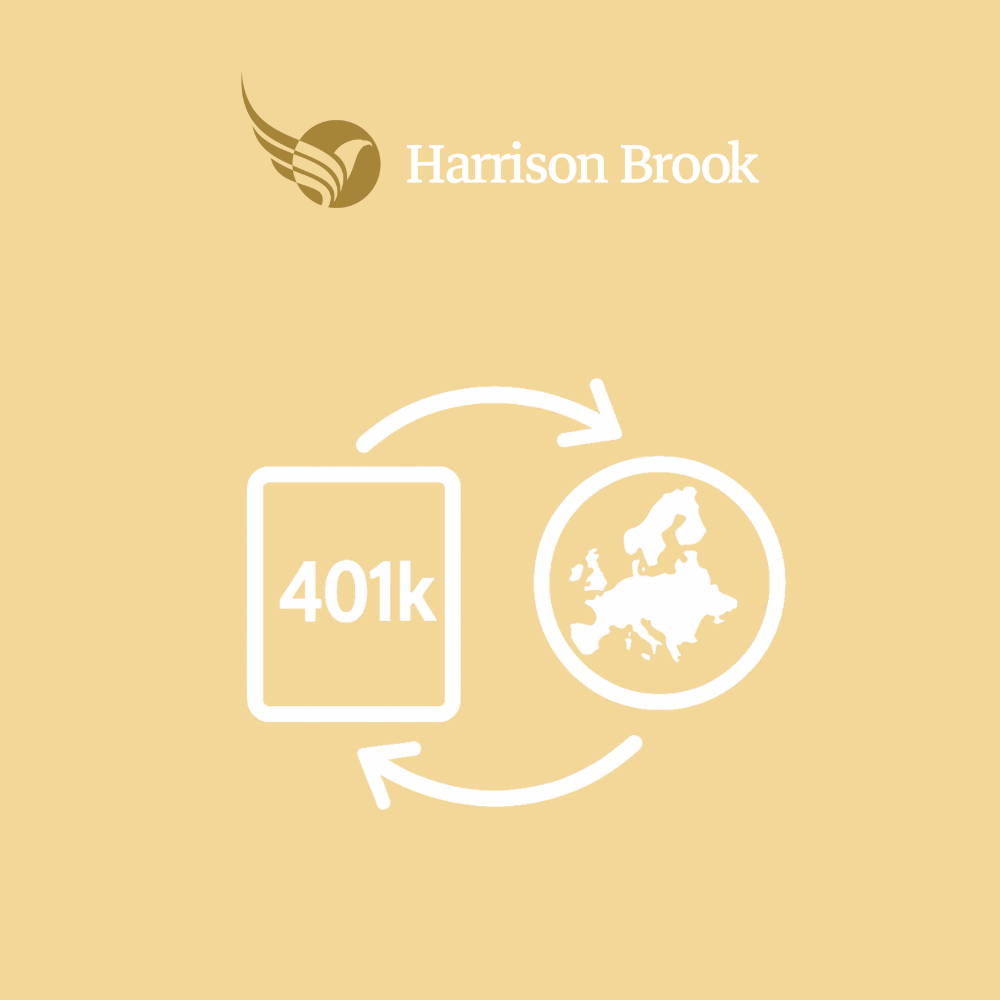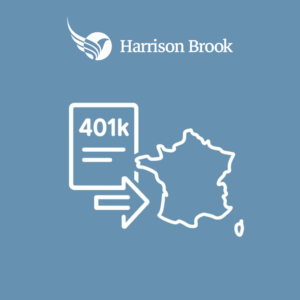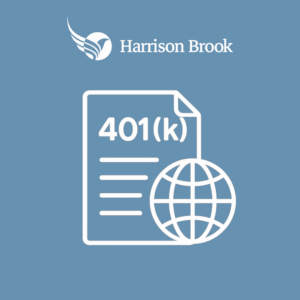
Relocating to Europe brings a mix of excitement and complexity, especially when it comes to your retirement savings. One of the most common questions American expats ask is what happens to their 401(k) when they move abroad. Can it stay in the United States? Should it be rolled over? How is it taxed in your new country of residence? Account management may also be subject to restrictions depending on the destination country.
If you are planning to move to Europe, understanding how to manage your 401(k) wisely can make a significant difference to your long-term financial security. Many US expats face these challenges and often have to make difficult decisions regarding their 401(k) when moving to Europe.
Understanding Your 401(k) When Living Abroad
Your 401(k) is a U.S.-based retirement plan, meaning it remains subject to American tax laws and regulations no matter where you live. You are not required to close your 401(k) simply because you move overseas. However, the way you manage it can have tax implications both in the U.S. and in your new country.
While some employers allow you to keep your 401(k) in place after you leave your job, you may have the option to leave your 401(k) with your former employer or roll it over into another plan. Others may require you to move the funds into an Individual Retirement Account (IRA) or other retirement accounts, such as traditional IRAs or Roth IRAs. This is often the preferred option for expats, as it provides greater investment flexibility and easier access for cross-border management. Transferring a retirement account overseas can be complex and may involve additional considerations.
Why Consider Rolling Your 401(k) into an IRA
Rolling over your 401(k) into an IRA often makes sense because it can provide several important benefits, especially for Americans moving to Europe.
An IRA rollover is often the most practical solution for Americans moving to Europe. Here are the key reasons:
- Greater control and flexibility: An IRA typically offers a wider range of investment options than a 401(k), giving you the benefit of broader investment choices and more control over your retirement savings.
- Consolidation: Rolling over multiple 401(k)s into a single IRA can simplify account management and help you better track your money.
- Cross-border tax efficiency: IRAs may offer more favorable options for structuring withdrawals and managing tax implications as an expat. It’s important to understand relevant tax law, including US tax law, when planning rollovers, as these rules can affect how your withdrawals are taxed and may impact your taxable income. Consulting a tax professional is advisable before making any rollover decisions to ensure compliance and optimize your financial outcome.
1. Greater Control and Flexibility
Unlike employer-sponsored plans, an IRA gives you access to a wider range of investment options. You can diversify across global markets, which is particularly useful for expats who want to align investments with their new life abroad.
2. Consolidation of Accounts
Many expats have multiple 401(k)s from different jobs. Rolling them into a single IRA simplifies administration and gives you a clearer overview of your total retirement balance.
3. Ease of Access and Portability
Once you move to Europe, dealing with a former employer’s 401(k) can be difficult. Some U.S. custodians refuse to maintain accounts for clients with foreign addresses. An IRA with an expat-friendly provider ensures continuity, remote management, and smoother communication. Roth IRAs also offer portability and flexibility for Americans living abroad, making them a valuable option for expats considering their retirement planning.
4. Cross-Border Tax Efficiency
While the U.S. continues to tax retirement income globally, your country of residence in Europe may also impose taxes on distributions. An IRA can help structure withdrawals in a more tax-efficient manner, especially when coordinated with a qualified cross-border financial adviser.
It is important to understand tax distributions and their implications for expats, as both the U.S. and your country of residence may have specific rules. Accurate tax reporting of withdrawals from retirement accounts is essential when living abroad to avoid penalties and ensure compliance. Additionally, proper documentation of these distributions is necessary for your US tax return when taking withdrawals from your 401(k) or IRA.
Managing Taxation Between the U.S. and Europe
One of the main challenges for Americans abroad is double taxation. The United States taxes citizens on worldwide income, regardless of where they live, so US citizens are subject to US tax on their global income even if they reside overseas. Most European countries will also tax local residents on their global income, which can create complex tax situations.
The key to avoiding paying tax twice lies in bilateral tax treaties. Many European countries, including France, Spain, Italy, and Germany, have tax agreements with the United States that determine how pension income is treated. Understanding US tax and US tax rules is essential when managing retirement accounts abroad, as some treaties allow taxation only in the country of residence, while others split taxation rights between the two nations.
When considering European countries, it’s important to note that other countries may have different tax treatments for US retirement accounts, which can affect how distributions are taxed and reported.
Working with a cross-border financial and tax specialist can ensure your 401(k) or IRA withdrawals are structured correctly, reported accurately, and optimized to minimize unnecessary tax exposure. US citizens must comply with both US and foreign tax rules when reporting retirement income.
What Happens If You Leave Your 401(k) in the U.S.?
You can leave your 401(k) where it is, but there are a few risks to consider:
- Limited access: Some plan providers restrict communication or online access for non-U.S. residents.
- Currency exposure: Your account remains denominated in U.S. dollars, which may not align with your long-term living expenses in euros or another European currency.
- Withholding taxes: Distributions to a non-U.S. address may trigger higher withholding rates.
- Estate planning complexity: U.S. estate tax and European inheritance rules can clash if not properly structured.
- Foreign retirement account challenges: Transferring your 401(k) to a foreign retirement account is generally not possible, as most foreign accounts do not meet U.S. legal requirements and such transfers can have adverse tax consequences.
- Foreign taxation: When living in Europe, distributions from your 401(k) may be subject to foreign taxation, depending on the tax laws of your country of residence, potentially increasing your overall tax liability.
- Retirement account overseas considerations: Managing a retirement account overseas involves additional compliance and reporting requirements, which can complicate your financial planning.
For many expats, transferring their 401(k) to an IRA is the first step to managing these challenges proactively.
Pension Plan Options in Europe
When moving to Europe, US expats are faced with a wide array of pension plan options, each with its own set of tax implications, reporting requirements, and benefits. Navigating this landscape requires a clear understanding of how foreign retirement plans interact with US retirement accounts and tax laws. The rules governing retirement accounts, such as the foreign earned income exclusion and foreign tax credit, can significantly impact your overall tax liability and retirement savings strategy.
European countries offer a variety of pension plans, and the tax treatment of these plans can differ greatly. For example, the UK’s workplace pension system and Germany’s Betriebliche Altersvorsorge (bAV) both provide opportunities for tax-deferred growth and employer contributions, but the specific tax laws, inheritance tax rules, and reporting obligations vary by country. US expats must carefully consider these differences, as well as their own income tax obligations and long-term retirement goals, when evaluating which retirement plan best suits their needs.
One of the most important considerations for US expats is the risk of double taxation. While the US taxes its citizens on worldwide income, many European countries also tax residents on global income, including distributions from US retirement accounts. To mitigate this, it’s essential to review tax treaties between the US and your country of residence. These treaties can offer special tax treatment for foreign pensions and retirement plans, potentially reducing your tax liabilities and helping you avoid paying taxes twice on the same income.
Transferring funds from a US retirement account to a foreign retirement plan can also have significant tax implications. Such transfers may be treated as early withdrawals by the IRS, triggering income tax and potential penalties. Before making any moves, it’s crucial to seek professional tax advice from experts familiar with expat taxes. They can help you understand the tax treatment of different retirement accounts, ensure full compliance with both US and foreign tax laws, and optimize your retirement savings strategy.
Ultimately, making informed decisions about your retirement accounts as a US expat in Europe means evaluating all available options, whether that’s maintaining a traditional IRA, exploring a Roth IRA, or participating in a foreign retirement plan. Consider the investment options, tax implications, reporting requirements, and potential benefits of each plan. By staying proactive and seeking professional guidance, you can maximize your retirement benefits, minimize tax liabilities, and secure your financial future while living abroad.
Cross-Border Financial Solutions for Expats in Europe
At Harrison Brook USA, we specialize in helping U.S. expats living in Europe navigate the complexities of managing American retirement assets overseas. Our advisers are experienced in cross-border financial planning, including helping expats manage their retirement accounts and tax obligations. Our expertise extends to:
- IRA rollovers for American citizens abroad
- Coordination with European tax advisers to ensure treaty compliance
- Portfolio management across multiple currencies
- Long-term financial planning for globally mobile professionals and retirees
For some clients, transferring into an International Retirement Account may be an option, offering flexibility for those planning to move again or retire in multiple countries.
Key Considerations Before Moving Your 401(k)
Before initiating any transfer, keep the following in mind:
- Avoid early withdrawal penalties. Moving funds incorrectly may trigger a 10% IRS penalty and ordinary income tax.
- Confirm your custodian’s expat policy. Some U.S. institutions cannot maintain accounts for overseas residents due to compliance rules.
- Seek independent advice. Every country’s tax treatment is different. France, for example, treats U.S. pensions differently from Portugal or Spain.
- Document every step. Keep records of transfers, valuations, and tax filings for both U.S. and local reporting, and ensure you have all necessary documentation for your US tax return.
FAQs on 401(k) Moving to Europe
Can I contribute to my 401(k) while living abroad? In most cases, no. Once you leave your U.S. employer, you can no longer make contributions to that 401(k). However, you may be able to contribute to an IRA if you have qualifying U.S.-sourced earned income. Other retirement accounts, such as traditional IRAs, Roth IRAs, or even certain foreign pension plans, may be alternatives to consider depending on your situation.
Is it possible to cash out my 401(k) before moving? You can, but it is rarely recommended. Early withdrawals before age 59½ attract a 10% penalty plus income tax, which can significantly reduce your savings.
Do I need to pay tax on my 401(k) in Europe? This depends on where you live. Some countries treat U.S. pensions as foreign income taxable locally, while others exempt them under a double tax treaty. For examples, the UK generally exempts U.S. 401(k) distributions under the treaty, while Spain and France may tax them as regular income. Always consult a tax specialist before taking distributions.
What about Roth 401(k) or Roth IRA accounts? Roth accounts grow tax-free in the U.S., but not all European countries recognize their tax-free status. France and Germany, for example, may still tax withdrawals. A cross-border adviser can help plan around these differences.
Take Control of Your 401(k) Before Moving Abroad
Relocating to Europe is an incredible opportunity to experience a new lifestyle, but your financial future deserves equal attention. Whether you are retiring in France, working in Spain, or starting a new chapter in Italy, your 401(k) and IRA planning will have a direct impact on your comfort and security abroad.
At Harrison Brook USA, we guide American expats through every stage of the process — from rolling over a 401(k) to managing IRAs and coordinating with international tax specialists. Our goal is to simplify complex cross-border finances and help you make confident, informed decisions.
Speak with a cross-border financial adviser today to ensure your retirement savings are fully aligned with your life in Europe.



